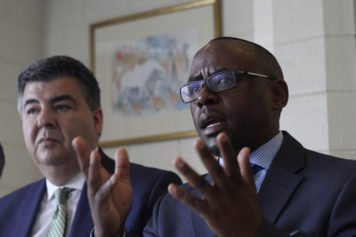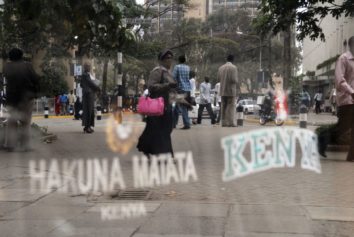Kenya’s President Uhuru Kenyatta and his deputy have been named in connection with post-election violence in a long-awaited report investigating human rights abuses in the country.
The report gave no recommendation for action to be taken against Kenyatta and Vice-President William Ruto.
The report’s chairman told the BBC this was because they already face charges at the International Criminal Court.
Kenyatta and Ruto deny such allegations.
The Truth Reconciliation and Justice Commission (TRJC) was set up following deadly post-election clashes five years ago.
After those elections some 1,500 people were killed and more than 600,000 forced to flee their homes.
The panel’s mandate was to investigate and recommend appropriate action on human rights abuses committed between Kenyan independence in December 1963 and the end of February 2008 – including politically motivated violence, assassinations, corruption and land disputes.
Call for apologies
Kenyatta and Ruto, who were on opposite sides in 2007, won elections together in March.
The report says they stand accused of “planning incitement and financing violence during 2007/2008 post-election violence”.
The BBC’s Wanyama wa Chebusiri in the capital, Nairobi, says that although no action is recommended by the TRJC, it does recommend further investigation and prosecution of high-profile personalities in their administration over allegations of inciting and the violence following the 2007 elections.
They include Najib Balala, the new minister for mining, and two senators.
The TJRC report also recommends that its own chairman, Bethuel Kiplagat, face further investigation over the Wagalla massacre in 1984, when he was serving as permanent secretary in the Foreign Affairs Ministry in former President Daniel arap Moi’s administration.
It recommends that those with alleged involvement in the Wagalla massacre should no longer hold any public office.
The killings occurred in 1984 during efforts to disarm ethnic Somali clans in the northeast of the country. The government said that 57 people were killed but survivors say close to 5,000 people died.
The TJRC suggests that Kenyatta offer a public and unconditional apology to all Kenyans for gross human rights violations since independence within the next six months.
State security agencies should also apologize, especially for acts of extra-judicial killings, arbitrary and prolonged detention, torture and sexual violence, it says.
Read more: BBC


